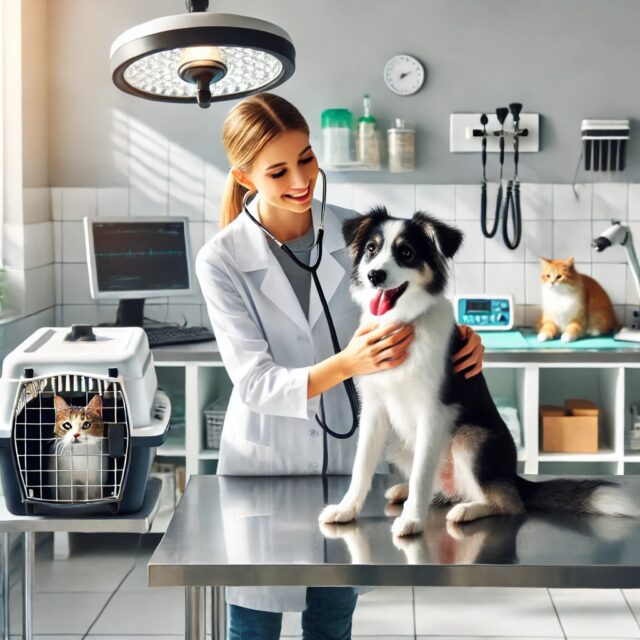The Importance of Annual Wellness Exams for Pets
Your pet’s health is more than just daily care—it’s an investment in their future. As a loving pet owner, you want your furry friend to live a long, healthy, and happy life. One of the most effective ways to ensure this is by scheduling regular veterinary wellness exams. These annual check-ups are critical to detecting health issues early, preventing diseases, and helping your pet thrive. Here’s why annual wellness exams are a must for all pets.
What Is an Annual Wellness Exam for pets?
An annual wellness exam is a routine veterinary check-up that evaluates your pet’s overall health. During this visit, your vet will assess your pet from nose to tail, ensuring they are in optimal health. While the frequency of exams may vary depending on your pet’s age and health status, most veterinarians recommend an exam at least once a year—more frequently for senior pets or those with chronic conditions.
Key Components of a Wellness Exam Include:
- Physical examination: Your vet will check your pet’s weight, coat condition, eyes, ears, teeth, and more.
- Heart and respiratory checks: These help detect underlying heart or respiratory conditions.
- Blood work and lab tests: Essential for detecting infections or other internal issues not visible during a physical exam.
- Vaccinations and boosters: Keeping up with vaccines is critical for preventing serious diseases.
- Parasite prevention: Your vet will check for signs of parasites and recommend preventive measures.
- Behavior, diet, and lifestyle discussions: Address any concerns related to your pet’s behavior or diet to keep them in peak health.
Early Detection of Health Issues
One of the most significant benefits of annual wellness exams is the early detection of health issues. Pets are experts at hiding symptoms of illness. By the time they show outward signs, the condition may already be advanced. Regular exams allow your vet to catch these issues early, often before they become serious or life-threatening.
Common Conditions Caught Early Through Wellness Exams:
- Dental disease: One of the most common health problems in pets that can lead to pain and infection if untreated.
- Obesity: Vets can help detect weight gain early and provide solutions before it leads to more severe issues like diabetes or joint problems.
- Heart disease: Early detection can allow for treatment that extends your pet’s life.
- Arthritis: Detecting joint pain early can prevent further deterioration with proper treatment.
- Cancer: Some forms of cancer can be caught early with blood tests or palpation during physical exams.
A routine wellness exam for a 7-year-old dog revealed an early-stage heart murmur that the owner had not noticed. With early detection, the veterinarian was able to start treatment immediately, preventing the condition from worsening and extending the dog’s quality of life.
Prevention is always better than cure, and wellness exams are a prime opportunity for preventive care.
Vaccinations are essential to protect your pet from deadly diseases like rabies, distemper, and parvovirus. Your vet will ensure your pet stays up-to-date with their vaccination schedule, safeguarding them from these preventable illnesses.
Parasite Control: Fleas, ticks, and heartworms are not just nuisances; they can cause serious health problems. During your pet’s wellness exam, the vet will check for signs of parasites and recommend appropriate treatments and prevention methods. Consistent protection against parasites can help avoid diseases like Lyme disease and heartworm, which can be life-threatening.
Nutritional Advice and Weight Management: Diet plays a significant role in your pet’s health. Vets use wellness exams to offer nutritional guidance and monitor weight-related issues. This helps prevent obesity and related conditions like diabetes, ensuring your pet maintains a healthy weight throughout their life.
Dental Care: Good dental hygiene is often overlooked in pets. During a wellness exam, the vet can spot early signs of dental disease and suggest cleanings or other treatments to keep your pet’s teeth healthy.
Common Health Issues in Senior Pets:
As pets age, their health needs evolve. Senior pets often require more frequent check-ups due to the increased risk of developing chronic conditions. Annual wellness exams—or even biannual exams for seniors—allow for early intervention and management of aging-related health issues.
Common Health Issues in Senior Pets:
- Joint issues and arthritis: Aging pets may develop stiffness and pain, which can be managed with medication or physical therapy.
- Decreased mobility: Regular exams help monitor mobility issues and offer solutions like supplements or exercise routines.
- Cognitive decline: Just like humans, pets can experience cognitive decline as they age, and early detection allows for proper care.
Managing Chronic Conditions: Wellness exams are essential for monitoring and managing chronic conditions like kidney disease, diabetes, or heart disease. With regular check-ups, vets can adjust treatment plans and medications to keep your senior pet comfortable and happy.
Personalized Care Based on Your Pet's Lifestyle and Breed
Every pet is unique, and their care should reflect that. During a wellness exam, your vet will tailor their advice to your pet’s specific needs, considering factors like breed, age, and lifestyle.
Breed-Specific Health Risks: Certain breeds are more prone to specific health conditions. For example, large dog breeds like German Shepherds are more susceptible to hip dysplasia, while brachycephalic breeds (like Bulldogs) often suffer from respiratory problems. Your vet will be aware of these risks and take preventive measures to address them early on.
What Pet Owners Can Expect During a Wellness Exam
Pre-Visit Preparation: Before bringing your pet to the vet, ensure you have any necessary medical records, and follow any fasting instructions if blood work is needed. This helps ensure the exam goes smoothly.
During the Visit: The vet will conduct a thorough physical examination, ask about any concerns or changes in your pet’s behavior, and perform necessary tests or vaccinations.
Post-Exam Follow-Up: After the exam, the vet will provide recommendations based on their findings. This might include dietary changes, medications, or follow-up appointments. Keeping up with these suggestions is essential for maintaining your pet’s long-term health.
Annual wellness exams are the foundation of a healthy, happy life for your pet. They allow for early detection of health issues, provide critical preventive care, and ensure your pet’s lifestyle is optimized for their breed and age. Remember, your pet can’t tell you when something’s wrong, but your vet can. Regular check-ups are the best way to ensure your furry companion enjoys many years of love and companionship.



Запчасти ВАЗ: экономьте время и деньги, заказывая в удобном онлайн-каталоге
автомагазин ваз [url=https://zapchasti-vaz01.ru/]автомагазин ваз[/url] .
Your comment is awaiting moderation.